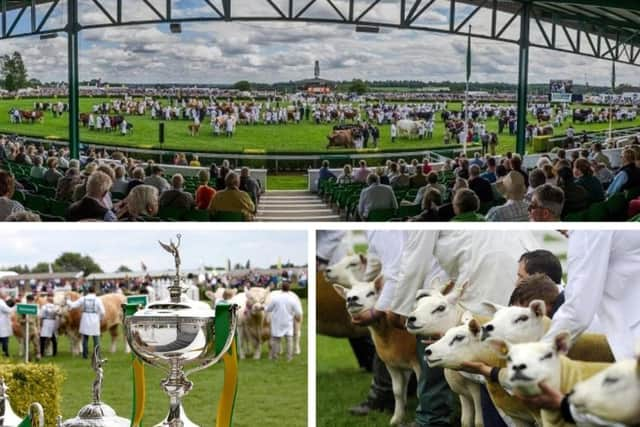Nigel Pulling: The challenges facing farmers as landmark Great Yorkshire Show begins
There is little doubt there will be a number of pressures on farmers in coming years as they seek not only to overcome the changes they face, but also to juggle the ever-present demands both for cheap food and improved management of the environment.
Environment Secretary Michael Gove has said that future subsidies will no longer be based on land ownership but will have to be earned through “public goods”, such as increasing biodiversity, enhancing the natural environment and improving animal welfare standards. The Government has agreed to maintain current subsidies for three years after Brexit, until 2022.
Advertisement
Hide AdAdvertisement
Hide AdA high percentage of farmers heavily rely on current support payments in the face of prices often failing to reflect their true costs of production. With potential future trade agreements further exposing our farmers to cheaper imported products, produced to widely differing standards, the challenge to feed an ever increasing global population using fewer resources such as fertiliser and water continues apace.


Farming is often seen as a traditional, conventional industry but this is something of a myth with many farms adopting the latest, cutting-edge technology as they strive to maximise yields, cost efficiencies and benefits to the environment.
There are displays of the history of farming and the Great Yorkshire Show to mark its 160th anniversary by the Yorkshire Film Archive and the Washburn Heritage Centre clearly demonstrating that farmers have never been reluctant to become early adopters of new technology, with photographs of machinery in use and on display dating back decades.
The industry as a whole was quick to realise that a job which might take several men and horses a week to complete could be speeded up with the addition of a single machine. Agricultural machines have been exhibited at the show ever since they came into being and we learned recently that an ancestor of one of our regular exhibitors, Paul Russell of the Russell Group, was awarded a medal at the 1867 Yorkshire Show for an improved machinery part. Paul is continuing the family link by offering farmers the chance to win a tractor for a year at this year’s show.
Advertisement
Hide AdAdvertisement
Hide AdMore recently, farmers have explored new cultivation methods such as minimum or no till operations, which increase efficiency while minimising soil disturbance to give environmental benefits.
Tractors and combine harvesters are no longer the simple working machines they once were, now costing tens and hundreds of thousands of pounds and boasting GPS and camera technology, again increasing efficiency.
Fertiliser can now be spread with great accuracy to minimise impact by reducing wastage and possible run-off into waterways, while the latest seed drills can pinpoint the amount of seed necessary per square metre, depending on land type and conditions.
Photo recognition of weeds is also now possible, to allow targeted spraying.
Advertisement
Hide AdAdvertisement
Hide AdThe agricultural sector is also an early adopter of drone technology, enabling accurate mapping of crop patterns field by field and remote inspection of boundaries and water courses.
New technology is also improving animal welfare, with new and more humane developments every year.
For example, the latest robotic milkers not only supply the daily pinta, they feed the cows and monitor their health and allow them to be milked “on demand”.
Some farms use a form of pedometer to monitor herd movement.
Advertisement
Hide AdAdvertisement
Hide AdThese types of technological innovations are showcased at the Great Yorkshire Show through our annual White Rose What’s Next innovation award which give manufacturers the opportunity to share the very latest ideas, both for livestock and arable.
We introduced the award four years ago to encourage and promote innovation in farm machinery. Firms developing new technologies can bring them to the show to be seen by thousands of farmers over the three days.
A lot of this year’s entries focus on the welfare and better management of livestock utilising technology.
The continued development of new technology and cultivation techniques is encouraging in what is likely to be the most fundamental period of change for farming in a lifetime. Farmers are a resilient and innovative breed by nature and I am sure that as well as dealing with the new pressures, they will also make the most of the new opportunities that will also arise.
Nigel Pulling is chief executive of Yorkshire Agricultural Society.